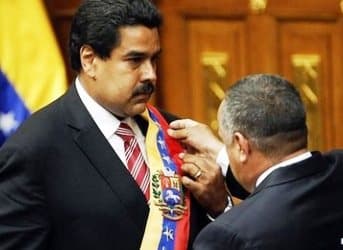The apparent victory for Nicolos Maduro in the Venezuelan presidential election may give the United States a sense of hope for improved ties with the Latin American oil giant. His service as a diplomat could make him at least tepid toward Washington, a sentiment backed by outreach efforts before the election. U.S. supermajor Chevron, meanwhile, is among the major players expressing interest in the vast oil deposits that lie off Venezuela's coast. Caracas, for its part, is eager to bring more foreign investors into the country. With U.S. oil production in a boom cycle, however, it's unclear if U.S. eyes will focus on Venezuelan developments given the evolving tilt toward other hemispheres.
Before his death in March, Hugo Chavez left power in the hands of Maduro, his vice president and foreign minister. As foreign minister, Maduro moved Caracas closer to Western opponents like Belarus, the fading Syrian regime of Bashar Assad and Vladimir Putin's Russia. In February, Caracas said it was expecting a $1.1 billion upfront payment from Russian oil company Rosneft for work in the offshore Orinoco belt. Rosneft said it would come in later with $1.5 billion in financing for a project that could produce as much as 400,000 barrels of oil per day.
Venezuela passed Saudi Arabia in terms of crude oil deposits with an estimated 296.5 billion barrels at the end of 2011. Venezuelan Oil Minister Rafael Ramirez said that means the country may be a panacea for a world economy on the road to recovery.
Related article: VENEZUELA-US: Tell-Tale Signs of Hostile Environment for Investors
"We have always said that in the future the natural resources will become scarce and when the economy recovers and demand will come back then we will be one of the few countries able to respond to that," he said.
Two market reports last week – OPEC's and the U.S. Energy Department's – both forecast a decline in global oil demand in 2013, however. OPEC, in its April report, cut its forecast by 40,000 barrels per day to 800,000 bpd in part because of declining consumption in Europe and Japan. The U.S. Energy Information Administration, meanwhile, cut its 2013 forecast by 50,000 bpd to 960,000 bpd for the year.
The United States has been a key purchaser of Venezuelan crude in the past. U.S. representatives met with Maduro last weekend, saying there was an opportunity with the former foreign minister to "regularize the relationship." That could kick start diplomatic outreach efforts suspended during the Chavez era. U.S. consumption of Venezuelan crude, however, is in decline. The EIA said that, as of January, the United States imported 871,000 bpd of Venezuelan crude, down more than 17 percent from their December figures. Maduro, meanwhile, may draw on the long-standing relationship with Russian giants, and the Chinese economy. Venezuela already sends 430,000 bpd to China, a substantial increase from a decade ago. Despite a challenge to the polls from rival Henrique Capriles, Maduro may nudge open some of the doors closed by his mentor, Hugo Chavez. The outcome of that effort, however, depends on who's knocking.
By. Daniel J. Graeber of Oilprice.com


















